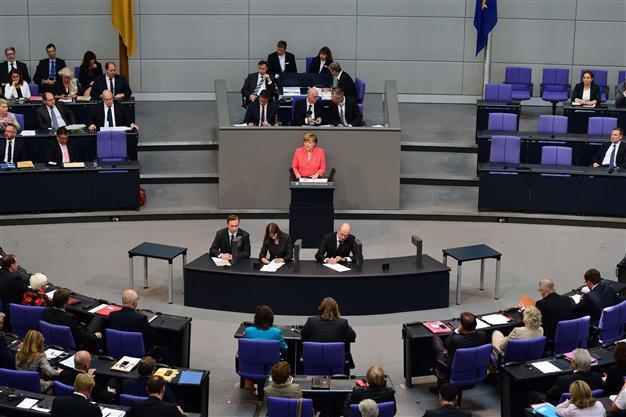Germany to vote on Greek bailout in crucial test for deal
BERLIN - Agence France-Presse

German Chancellor Angela Merkel speaks at the Bundestag, the German lower house of parliament in Berlin on July 17, 2015. AFP Photo
Chancellor Angela Merkel was to rally German lawmakers on July 17 to back talks for a new Greece bailout deal, a day after the parliament in Athens grudgingly agreed to harsh reforms.Merkel, like Greece's hard-left Prime Minister Alexis Tsipras, faces rebels in her own party ranks, but was ultimately expected to get approval from the chamber where her "grand coalition" commands an overwhelming majority.
On the eve of the Bundestag session starting at 0800 GMT, Merkel told conservative lawmakers she was "absolutely convinced" the new 86 billion euro ($94 billion) rescue package was the way forward.
The vote comes a day after European Central Bank chief Mario Draghi boosted a vital cash lifeline to Greece's struggling banks that will allow them to open their doors for the first time in almost three weeks on July 20.
It was Merkel -- leader of the EU's biggest economy and effective bailout paymaster -- who spearheaded the marathon Brussels talks last weekend that brought Greece back from the brink of crashing out of the eurozone, but at a high price.
To prevent a catastrophic "Grexit", Tsipras agreed to sweeping reforms on pensions, taxes and labour laws that were harsher than those he had urged people to reject in a July 5 referendum.
The about-face sparked violent street protest and speculation of early elections. Finance Minister Euclid Tsakalotos said his vote consenting to the lenders' terms "will burden me my whole life."
Eurozone ministers rewarded Greece on July 16 by approving a vital seven billion euro bridging loan and backing resumed negotiations for the third bailout package.
Merkel and her hardline Finance Minister Wolfgang Schaeuble have been harshly criticised for forcing more austerity on Greece, using the threat of a five-year euro "time-out" that had been floated by Schaeuble.
EU President Donald Tusk told the daily Frankfurter Allgemeine Zeitung that the idea gave Merkel an ideal threat scenario, but insisted the deal in the end aimed "solely at helping Greece."
If many commentators see Merkel as being too hard on Greece, dissenters at home complain she has been too soft, leaving German taxpayers to lend out billions they are unlikely to ever see again.
The mass-circulation Bild daily, which has long campaigned for a Grexit, on July 17 published a list of "seven reasons" to vote 'No' and wrote that "today politicians must show their true colours."
Germany is one of several EU countries whose parliaments must sign off of any debt deal for Greece. The German vote on July 17 is only about resuming official talks -- a final deal with Greece would also need the assembly's green light.
Up to 50 lawmakers from Merkel's conservative party have warned they will vote 'No' to granting her government a mandate to resume talks.
However, that still leaves a broad majority across major party lines in the 631-seat lower house who were expected to support the proposal, which aims to help Greece and keep intact the 19-member currency union.
Schaeuble -- who says he personally thinks a Grexit would be best for the country -- nonetheless urged his party-members to vote 'Yes'.
Merkel, sometimes dubbed Europe's de facto leader, was expected to reiterate her oft-stated case that the EU will only prevail in a globalised world if all its member states stick by strict fiscal rules and reform to become competitive.
Nearing a decade in power, Merkel, who turned 61 on Friday, commands high approval ratings.
On the Greece question, the public mood swung between pro-EU sentiment and anger over risking public funds, according to a poll July 17. Asked if they backed talks on a new bailout, 46 percent were in favour and 49 percent against, said the DeutschlandTrend survey.
The vote comes a day after the ECB gave Greece some badly needed breathing space by adding 900 million euros to a financial lifeline to Greece's cash-strapped banks, which have limited ATM withdrawals to 60 euros a day per person.
Draghi also sided with the IMF in saying Greece -- with debts worth 180 percent of GDP -- will need some kind of debt relief.
The IMF, one of Greece's creditors alongside the EU and the ECB, has warned creditors would have to go "far beyond" existing estimates for debt relief.
Its head Christine Lagarde on July 17 reiterated the point, speaking on French radio. Asked whether the plan could work without debt relief, she said "the answer is quite categorically, no."
Draghi, after months of roller-coaster negotiations, also conceded that doubts remain about the "willingness and capacity" of the Greek government to push through the economic reforms it has agreed to.
















